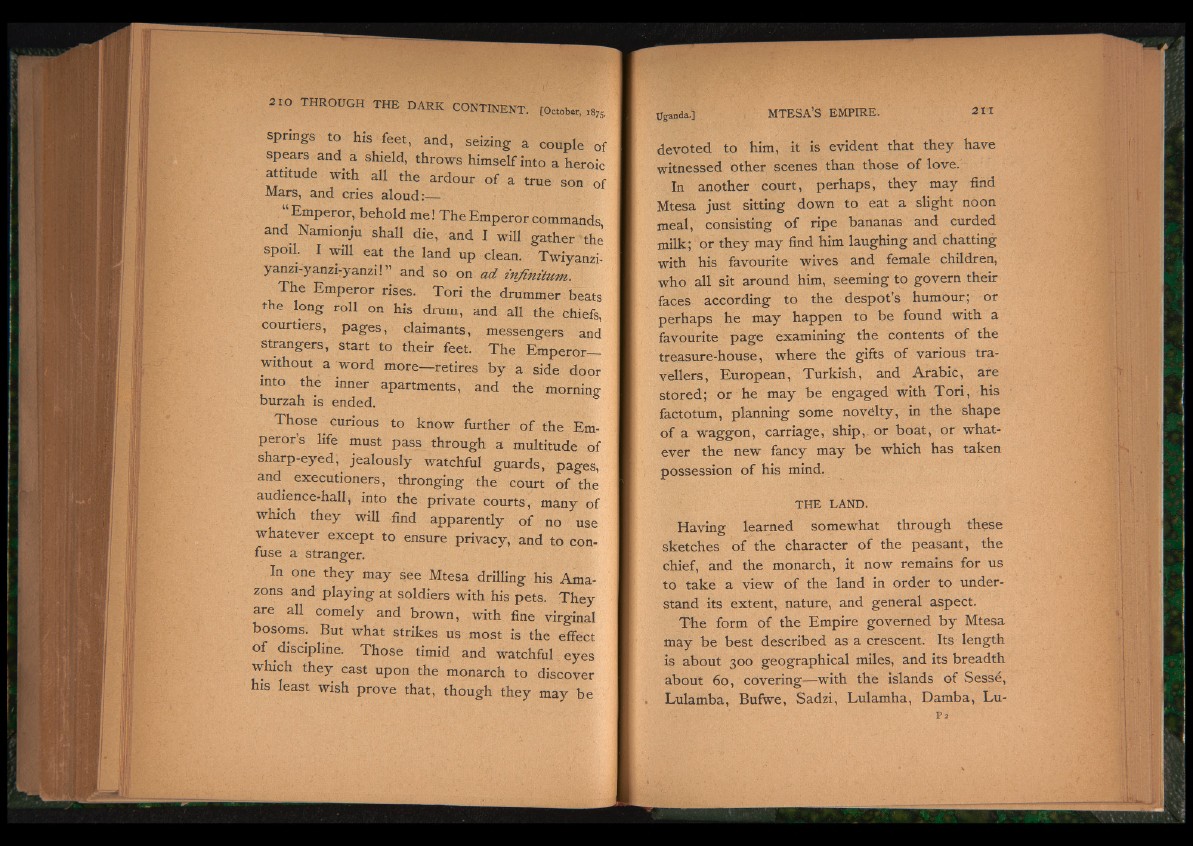
springs to his feet, and, seizing a couple of
spears and^ a shield, throws himself into a heroic
attitude with all the ardour o f a true son of
Mars, and cries aloud:—
Emperor, behold me! The Emperor commands
and Namionju shall die, and I will gather the
spoil. I will eat the land up clean. Twiyanzi-
yanzi-yanzi-yanzi!” and so on ad in fin itum .
T h e Emperor rises. Tori the drummer beats
the long roll on his drum, and all the chiefs,
courtiers, p a g e s , claimants, messengers and
strangers, start to their feet. T he Emperor—
without a word more— retires b y a side door
into the inner apartments, and the morning
burzah is ended.
T hose curious to know further o f the Emperor’s
life must pass through a multitude of
sharp-eyed, jealously watchful guards, pages,
and executioners, thronging the court o f the
audience-hall, into the private courts, many of
which they will -find apparently o f no use
whatever e x cep t to ensure privacy, and to confuse
a stranger.
In one th ey may see Mtesa drilling his Ama-
zons and playing at soldiers with his pets. T h e y
are all comely and brown, with fine virginal
bosoms. But what strikes us most is the effect
o f discipline. Those timid and watchful eyes
which th ey cast upon the monarch to discover
his least wish prove that, though th ey may be
devoted to him, it is evident that th ey have
witnessed other scenes than those o f love.
In another court, perhaps, they may find
Mtesa just sitting down to eat a slight noon
meal, consisting o f ripe bananas and curded
milk; or they may find him laughing and chatting
with his favourite wives and female children,
who all sit around him, seeming to govern their
faces according to the despot’s humour; or
perhaps he may happen to be found with a
favourite page examining the contents o f the
treasure-house, where the gifts o f various travellers,
European, Turkish, and Arabic, are
stored; or he may be engaged with T o r i, his
factotum, planning some novelty, in the shape
o f a waggon, carriage, ship,, or boat, or whatever
the new fancy may be which has taken
possession o f his mind.
THE LAND.
Having learned somewhat through these
sketches o f the character o f the peasant, the
chief, and the monarch, it now remains for us
to take a view o f the land in order to understand
its extent, nature, and general aspect.
T h e form o f the Empire governed b y Mtesa
may be best described as a crescent. Its length
is about 300 geographical miles, and its breadth
about 60, covering— with the islands o f Sesse,
Lulamba, Bufwe, Sadzi, Lulamha, Damba, Lu